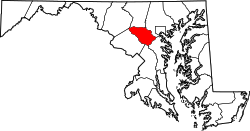Town Center Downtown Columbia | |
|---|---|
Village | |
| Columbia Town Center | |
 Intersection of Broken Land Parkway and Town Center Avenue | |
 Downtown Columbia featuring the Town Center and the Villages of Wilde Lake and Harper's Choice. | |
| Country | United States |
| State | Maryland |
| City | Columbia |
| Established | 1974 [1] |
| Founded by | James Rouse |
| Named after | Columbia's city center |
| Website | www |
Town Center is one of the ten villages in Columbia, Maryland, United States, first occupied in 1974. [2] The Town Center is a non-contiguous, diverse area, and the most urban-like, ranging from multi-level high density apartments, homes and office buildings to single family homes. [3]
Contents
- Names and history
- Original attractions
- Redevelopment efforts
- Services and entertainment
- Public transit
- References
- External links
The six residential neighborhoods in the village include Amesbury Hill, Banneker, Creighton's Run, Lakefront, Vantage Point, and Warfield Triangle. [3]







